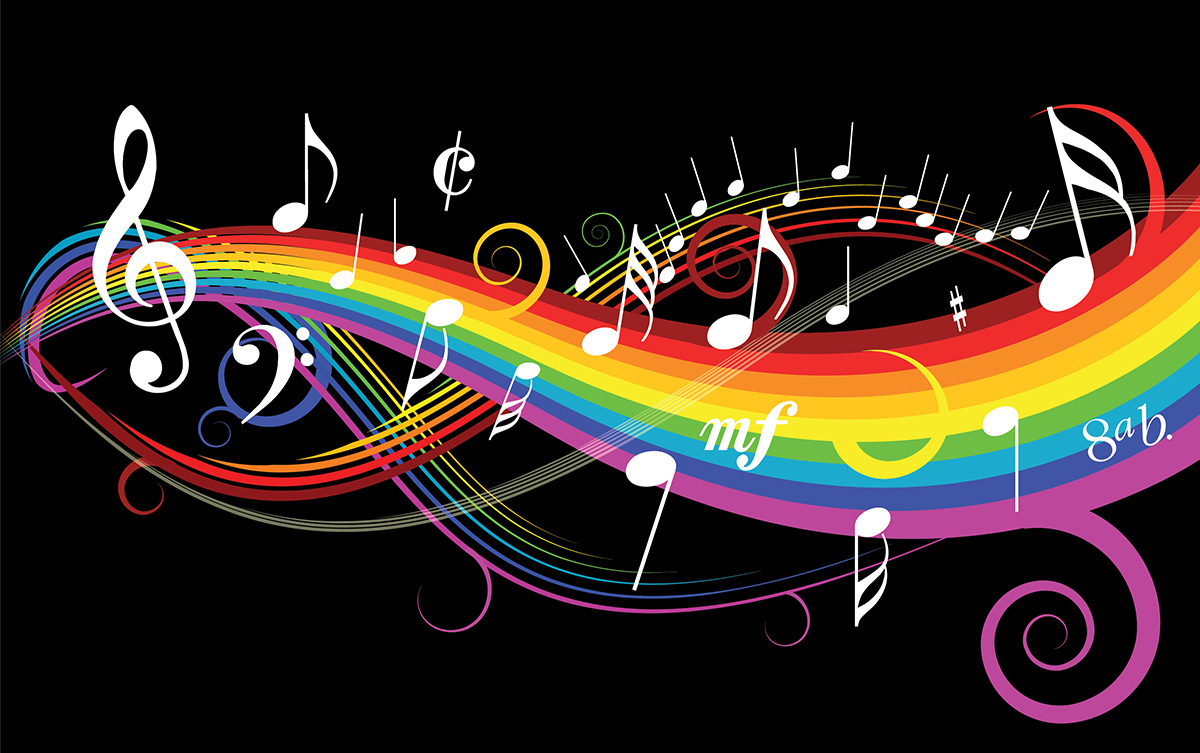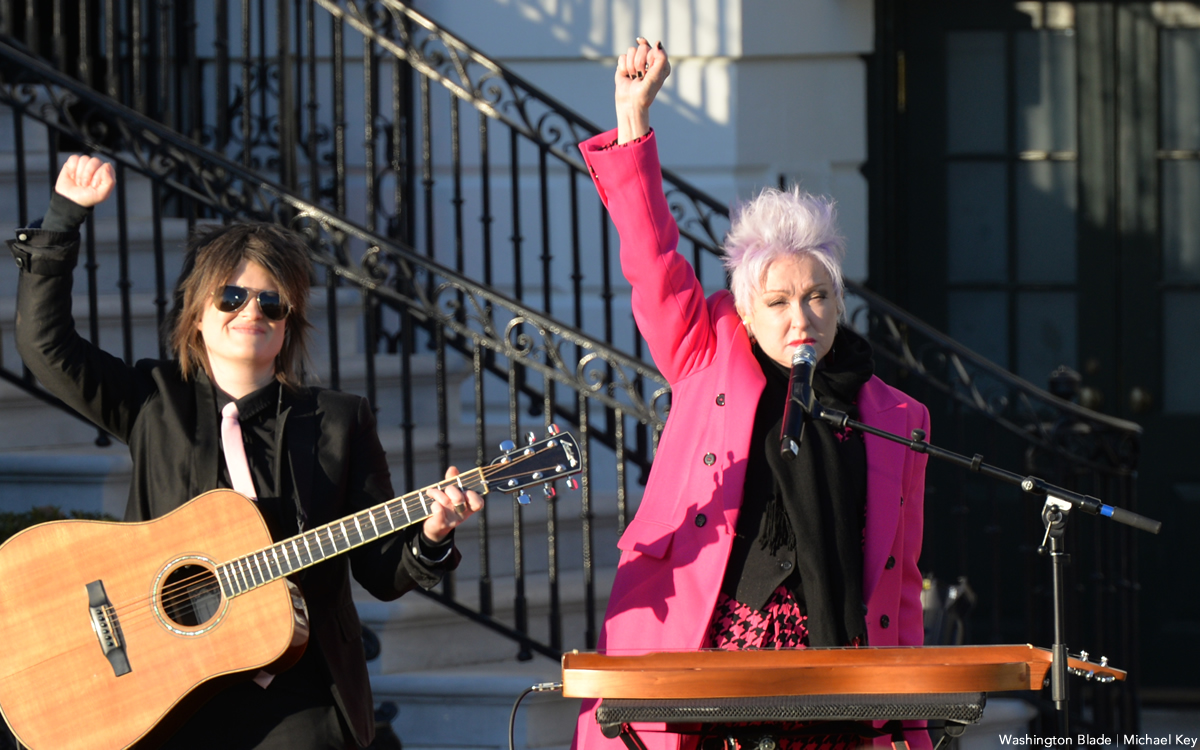Music & Concerts
New Tom Goss album is feathery, atmospheric left turn
Ambient project ’Territories’ is daring but only intermittently compelling


This week saw the release of songwriter Tom Goss’ seventh studio album “Territories.” Goss, who is best known in the gay music scene, not unlike Steve Grand, could be best identified by his distinctive brand of indie rock, a style he dedicated his previous six albums to perfecting.
Uptempo acoustic guitars and drums, an instrumentation like much of the indie rock music of the mid-2000s (think Augustana), undergirded Goss’ storytelling songwriting tendencies. But for Goss’ small, devoted following, “Territories” arrives as something of a shock.
Since his emergence on the scene around 2006, his focus has been on the kind of folk rock so conducive to storytelling, and his folksy, even slightly mushy lyrics have been successful in connecting with his gay audience. Although his 2016 “What Doesn’t Break” included far more synth and electronic effects, it could still be classified as characteristically indie-pop/indie-rock, even with a slightly harder edge.
The major influences of the new album seem to be ambient music and ASMR (autonomous sensory meridian response). ASMR has emerged in the past couple of years as a fad, which uses repeated, everyday sounds to create pleasurable feelings for listeners. “Territories,” produced by Ian Carmichael, capitalizes on the popularity of ASMR, creating tracks that would perhaps more accurately be considered soundscapes than songs.
It’s a curious, maybe savvy, move on the part of Goss and his producers, but the songs are effectively stripped of any internal drive. Instead of the music being moved by a palpable sonic tension, one has more the impression of floating along aimlessly. It’s ideal music for the bathtub, for intimacy, but is so disconnected from the ordinary rhythms of life that the music is hard to place. It’s like sweeping cinematography without the directed action of the plot. Nonetheless, there is a continuity to the wanderings, with many of the songs tied to specific geography (“Berlin,” “Quayside,” “Quebec,” “Amsterdam” and so on). And Goss succeeds in making the listener hear the distinction of each location.
Take for example the single “Berlin,” a story about sexual reawakening in the German capital. Of course, the city has been of interest to gay writers and artists, especially in the English-speaking world, since Christopher Isherwood’s classic “Goodbye to Berlin” in 1939. The subsequent adaptation of the novel into the 1972 movie “Cabaret,” starring Liza Minnelli, Joel Gray and Michael York, permanently cemented Berlin in the gay imagination.
The music video for “Berlin” pays tribute to this aesthetic, with its costumes and back-room-of-a-cabaret setting. It’s an interesting, conscious situation of a contemporary gay story in reference to iconic cultural markers. Press materials for the album say the song is inspired by Goss’s long-time husband’s infidelity and their subsequent decision to have an open relationship, which led Goss to a sexual reawakening.
“Quayside” is the best of the on location tracks — the song is balanced, not lacking in direction like many of the others. If anything, it suffers from an overly redundant chorus, not unlike Goss’ hymn to “Berlin.”
Despite the washy, vaguely nauseating synth punctuated by ASMR, the album manages a couple of gems despite itself. “Eve” is a fantastically balanced, sexy song that succeeds on every point. There is a delightful Ben Folds-esque quality to it, and rather swimming about without direction, the track takes us somewhere. It’s bound to be one of the more popular on the new album. Likewise, “Zedel” is a delightful blues-influenced track, which Goss pulls off deftly. One common feature of these tunes is that both are keyboard driven, which gives the music more structure and Goss a framework in which to shine.
“Territories” is a conceptually interesting album that suffers from a somewhat poor execution. It’s neither from a lack of production quality nor talent, but rather the absence of moderation. My bet is that the next album will favor a wholly different concept, and that, by that time, ASMR videos will have disappeared as quickly as they first popped up in our YouTube recommendations.
Music & Concerts
Washington chorale kicks off Christmas with vibrant program
‘Thine Own Sweet Light’ concerts planned

The full Washington Master Chorale will return for its annual holiday concert tradition with “Thine Own Sweet Light” on Friday, Dec. 19 and Sunday, Dec. 21 at St. Ann’s Catholic Church (D.C.) and Church of the Epiphany (D.C.).
The concert will feature the rich sounds of the 50-voice, a cappella chorus performing lush, seasonal choral music inspired by the theme of light. Highlights include Edvard Grieg’s “Ave Maris Stella,” Eric Whitacre’s “Lux Aurumque,” and Christopher Hoh’s “Holy, Holy, Holy is the Lord God of Hosts.” The program will also present a new work by Barcelona composer Josep Ollé i Sabaté, along with charming holiday folk songs and seasonal favorites.
For more details, visit the Washington Master Chorale website.
Music & Concerts
Queer mega stars (and allies) ready to take D.C. stages this fall
Watch LGBTQ icons light up stages across the DMV as they sing, dance, and drag their way through spectacular shows.

One of the best ways to welcome fall is by catching LGBTQ performers (and their allies) lighting up some of the D.C. area’s biggest stages. From country and pop to drag and rock, the season is packed with shows you won’t want to miss.
Maren Morris – The country, rock, and pop diva—known for hits like “The Bones” and for standing up against Nashville’s anti-LGBTQ voices—takes the stage at Wolf Trap (1551 Trap Rd, Vienna, Va.) on Friday, Sept. 12 at 8 p.m. Tickets start at $64.
RuPaul – The mother of modern drag and host of “RuPaul’s Drag Race” will spin a DJ set at Echostage (2135 Queens Chapel Rd NE) in Northeast D.C. on Sept. 20. Before RuPaul swaps wigs for headphones, Trade and Number 9 owner Ed Bailey will warm up the decks. For tickets and details visit echostage.com.
Conan Gray – The queer pop prince, celebrated for his Gen Z anthems like “Heather” and “Maniac,” brings his Wishbone Pajama Show to EagleBank Arena in Fairfax, VA, (4500 Patriot Cir) on Sept. 20 at 8 p.m. Tickets start at $113. For more info visit shop.conangray.com/pages/tour.
All Things Go Music Festival – With a lineup that includes Noah Kahan, Lucy Dacus, Kesha, Clairo, Doechii, and more, the beloved LGBTQ-friendly festival takes over Merriweather Post Pavilion (10475 Little Patuxent Pkwy, Columbia, Md.) Sept. 26–28. For tickets and details visit allthingsgofestival.com.
BERTHA: Grateful Drag – This unique tribute brings drag artistry and the sounds of the Grateful Dead to The Atlantis (2047 9th St NW) on Sept. 27. Tickets start at $47 at theatlantis.com.
Peach PRC – Rising Australian pop star and out lesbian, whose confessional tracks like “Perfect for You” and “Forever Drunk” have made her a queer TikTok darling, performs at The Atlantis on Sept. 29 at 6:30 p.m. The show is general admission only. Additional details are on theatlantis.com.
Addison Rae – The TikTok star-turned-pop princess, who’s crossed over into music with glossy hits like “Diet Pepsi” brings her sold out show to The Anthem (901 Wharf St., S.W.) on Sept. 30. Tickets are sold out, but resale options start around $80. For more info visit theanthemdc.com.
The Rocky Horror Picture Show 50th Anniversary – Celebrate the cult classic that’s been a queer midnight-movie staple for decades, with Barry Bostwick (a.k.a. Brad Majors) at the Warner Theatre (513 13th St., N.W.) on Oct. 2 at 8 p.m. Tickets start at $41 via Ticketmaster.
Chaka Khan, Patti LaBelle, Gladys Knight & Stephanie Mills – Four legends, one stage. Between Khan’s funk, LaBelle’s soul, Knight’s R&B, and Mills’ powerhouse vocals, this concert at Capital One Arena (601 F St NW) on Oct. 3 at 8 p.m. promises pure diva magic. Tickets start at $103. For more details visit capitalonearena.com.
Lorde – Joined by The Japanese House and Chanel Beads, the Grammy-winning New Zealand singer-songwriter behind “Royals” and “Solar Power” returns to The Anthem on Oct. 4 at 7 p.m. Lorde has long been embraced by queer fans for her dreamy pop and subversive lyrics. For more info visit theanthemdc.com.
Andy Bell (of Erasure) – The British queer rock icon, best known for synth-pop classics like “A Little Respect” and “Chains of Love,” brings his Ten Crowns Tour to the Lincoln Theatre (1215 U St., N.W.) on Friday, Oct. 17 at 8 p.m. Tickets are $90.45.
Doechii – The self-described queer “Swamp Princess”—and WorldPride 2025 headliner—continues her breakout year with the Live from the Swamp Tour at The Anthem on Oct. 21 at 8 p.m. Known for blending rap, R&B, and avant-garde performance art, Doechii is one to watch. Tickets start at $153.
Neon Trees – The out-and-proud Utah rockers behind “Everybody Talks” and “Animal” perform at the Lincoln Theatre on Friday, Oct. 24 at 8 p.m. Lead singer Tyler Glenn, who came out publicly in 2014, has become a strong queer voice in alternative rock. For tickets and info visit impconcerts.com.
Sasha Colby – The “RuPaul’s Drag Race” Season 15 winner strips down on the Stripped II Tour at the Warner Theatre on Nov. 2 at 8 p.m. Tickets available now on Ticketmaster.
Lola Young – The bisexual indie-pop sensation, whose raw songwriting has earned her millions of TikTok fans and multiple chart soaring hits visits The Anthem on Nov. 9 at 8 p.m. Tickets are still available.
Opera Lafayette
Featuring Mary Elizabeth Williams as Dido
+ Elijah McCormack, Chelsea Helm
Oct. 16, 7:30 p.m.
Sixth & I
PostClassical Ensemble
The Pale Blue Do: A Musical Voyage Inspired By Nature
Featuring National Geographic’s Enric Sala, Guest Curator
Wednesday, November 19, 7:30 p.m.
Terrace Theater
Washington Concert Opera
Starring Kate Lindsey, Theo Hoffman, John Moore, and Fran Daniel Laucerica
Nov. 23, 6 p.m.
Lisner Auditorium
Washington Master Chorale
An intimate a capella concert taking place in an architectural jewel, featuring cherished choral gems from Anglican and Catholic tradition and early American hymns. The concert will also present the world premiere of Christopher Hoh’s Holy, Holy, Holy is the Lord God of Hosts, and hymn singing featuring Robert Church, organist and choirmaster at St David’s.
Oct. 18, 7:30 p.m.
October 19, 5 p.m.
St. David’s Episcopal Church
Music & Concerts
Cyndi Lauper ready to have fun in Virginia
Superstar to bring final leg of farewell tour to Jiffy Lube Live

Superstar Cyndi Lauper will bring the final leg of her farewell tour “Girls Just Wanna Have Fun” to Bristow, Va., on Thursday, July 24 at Jiffy Lube Live.
Lauper’s international Farewell Tour – her first major headlining run in a decade – kicked off in North America last October, and included her first time ever headlining (and selling out) Madison Square Garden. Lauper’s performances have earned raves from the New York Times, Rolling Stone, Billboard, and many more, and surprise guests have included Chaka Khan, Sam Smith, and Hayley Williams. The tour just visited the U.K. and Europe, and will head to Australia and Japan in April.
Tickets are available on Live Nation’s website.
-

 Virginia3 days ago
Virginia3 days agoMcPike wins special election for Va. House of Delegates
-

 New York5 days ago
New York5 days agoPride flag removed from Stonewall Monument as Trump targets LGBTQ landmarks
-

 Florida5 days ago
Florida5 days agoDisney’s Gay Days ‘has not been canceled’ despite political challenges
-

 District of Columbia5 days ago
District of Columbia5 days agoCapital Pride wins anti-stalking order against local activist




















